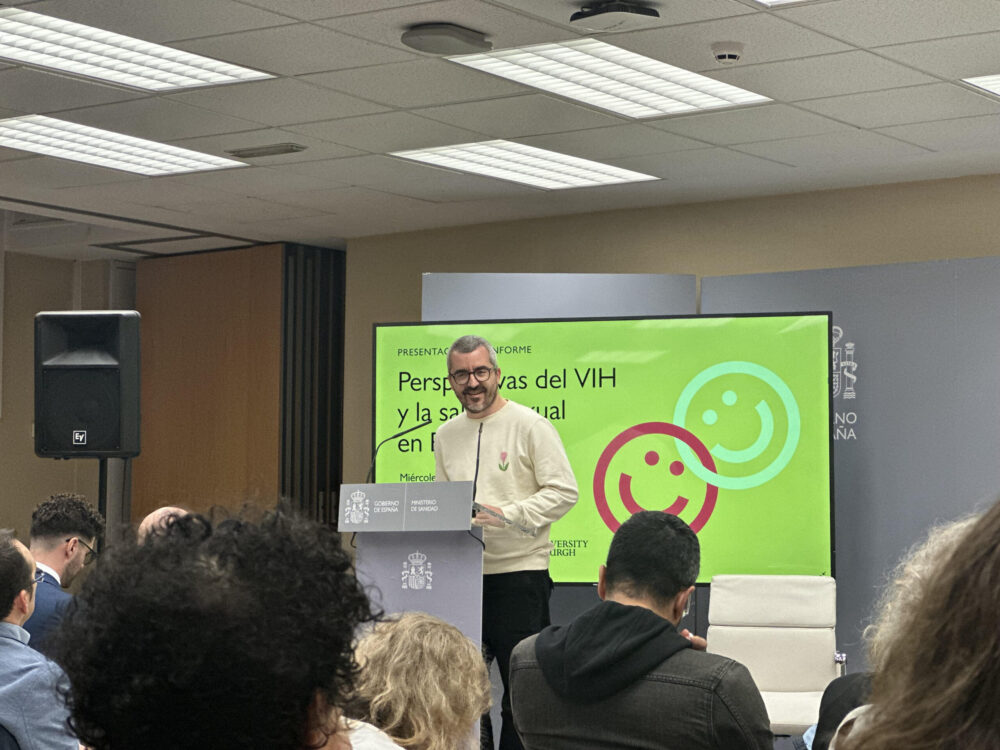Health warning: Spain sees alarming rise in STI incidence

On the morning of October 16 Javier PadillaMinister of Health and Julia del Amo, The director of the department of HIV, STIs, viral hepatitis and tuberculosis of the ministry presented the report “Perspectives on HIV and sexual health in Spain”, led by Edinburgh University scientist Jaime García Iglesias, which includes the views of activists, health workers, politicians and technical specialists on the incidence of the virus and its approach in both the health and psychosocial spheres. The Executive Director of UNAIDS also attended the session Winnie Byanyimaon an official visit to the ministry’s headquarters.
According to the study, Spain has made significant progress in the fight against HIV in recent years.However, the country’s sexual health landscape presents “important challenges”. It is observed, for example, “a. alarming rise in incidence of other sexually transmitted infections (STIs)in addition to persistent inequalities in access to healthcare for vulnerable groups,” according to what is reflected.
Directions of work and next steps
That is why in his speech Padilla wanted to highlight several areas of work that the department he heads is developing together with numerous health organizations, including SEISIDA, CESIDA, hospital services and units, as well as experts and others. “We know we need science, new drugs (…) but we also need social science, social change and political confrontation,” he said in relation to addressing HIV at the national level. “Those scientific advances that lead to big changes will not make any changes if they do not reach the people they need to reach.”
Thus, in relation to challenges launching the Report, the main directions are focused on five specific areas: development new drugs and guarantee access to them throughout the world; distribution and improving access to PrEP; emphasis on promotion of psychosocial problems: advances in prevention through education, treatment, destigmatization and mental health promotion; development horizontal public health policy that promote equality and provision of budget lines, as well as increasing the volume of human and economic resources.
What does the Strategic Plan for HIV and STI Prevention and Control say?
Subsequently From the Master confirmed that “many of the areas for improvement” identified in the study “match” those identified by the “state and regional departments” among which he is providing coordination, and when asked about the specification of next steps, he noted that all future actions are based on issues reflected in Strategic plan for the prevention and control of HIV and STIs 2021-2030 in Spainthe main points of which are concentrated around the following axes:
- Universal health coverage, capitalallocation, coordination and complementarity as guiding principles.
- Includes both transversal approaches emphasis on rights, gender, migration and sexual diversity, emphasis on social determinants of health and approach community participation.
- The overall goal is to promote and coordinate actions to elimination of HIV and STIs as a public health issue in 2030.
- It pursues four strategic goals:
- Promote combined prophylaxis HIV and other STIs by promoting comprehensive sexual health.
- Promote early diagnosis.
- Promote early treatment And chronic disease management.
- Improve the quality of life of people with HIV and people with STIs by ensuring equality of treatment and opportunitynon-discrimination and full enjoyment of rights.

For my part, Winnie Byanyimaexecutive director UNAIDStook the floor to highlight issues that the department he heads considers fundamental. Thus, he called for global coordination and a policy of “extended hands” between various countries.
In the same way, as described, the Director advocated promotion and access to treatment available and confirmed the importance sex educationespecially for young people: “The more sex education, the better the health and the more safety,” he said. Moreover, he demanded the creation of an international union and the creation work together to end discrimination and stigma as a “global responsibility in this pandemic” and an assessment of the psychological consequences, putting it on expansion of mental health services.
